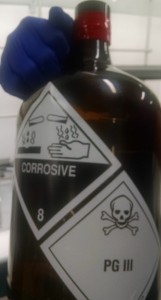Many of us can recall a time that we were the target of the trite phrase, “This is going to hurt me more than it is going to hurt you.” More often than not this not-so-truthful saying was accompanied by the use of stinging isopropyl alcohol on a scraped knee. Since our earliest days, we have been familiar with isopropyl alcohol, otherwise known as rubbing alcohol. In spite of the sting, it has been the hero of the day, keeping our “boo boos” clean and on their way towards healing.
Did you know that isopropyl alcohol has an evil twin? Let us introduce you to Hexaflouroisopropanol, otherwise known as HFIP.
HFIP is an organic compound that is used to dissolve polymers, and is very close in molecular structure to isopropyl alcohol. While isopropyl alcohol is composed of six hydrogen atoms, HFIP is composed of six fluorine atoms. This subtle change results in a chemical that doesn’t just slightly sting, like isopropyl alcohol, it severely damages flesh on contact!
It’s no wonder that extreme caution must be used when handling HFIP. This corrosive solvent causes severe burns with direct contact to skin and immediate blindness if it comes in contact with the eyes. If inhaled, the vapor of HFIP can cause respiratory damage. The use of HFIP as a solvent for polymer testing is a risk that not all testing labs are willing to take or have the expertise to safely accommodate. However, our experts are trained extensively and have proven their competency with this dangerous but very effective solvent.
Why use a solvent if it is so dangerous? Great question. HFIP is a necessary solvent for various testing applications because it has the ability to dissolve a number of particularly stubborn polymers that won’t dissolve in other solvents. Some of those polymers include polyethylene terephthalate, polyamides (nylon), polyacetal (Derlin), and polyglycolide (bioabsorbant polymers). By dissolving these polymers in HFIP we are able to perform testing, such as molecular weight analysis. This is critically important to clients across a variety of industries because molecular weight dictates key physical properties of polymers. For example, it determines the temperatures used for conversions from solids to viscous liquids, and the strength and toughness of a plastic product. Without HFIP, determining molecular weight and understanding performance characteristics of certain polymers just wouldn’t be possible. Not only is this molecular weight analysis valuable for current products and materials but it enables scientists and materials engineers to further develop new products by providing critical data sets that allow for proper material selection and engineering.
Although HFIP provides a tremendous testing advantage many labs shy away from the use of this solvent. Certainly one consideration is the hazards previously mentioned. Other reasons are the cost and logistical challenges of acquiring it. HFIP is priced at more than $1,000 a liter! According to our Safety Manager, Alan Sentman, three reasons why HPIF is so expensive are; “The raw materials used to make HFIP are expensive, the process used to make it is difficult and dangerous, and the process needed to purify it after it is made is difficult and therefore expensive.” It is also hard to obtain HFIP because it is a specialty solvent, which means it is not a high volume product like other solvents and the ability to acquire it quickly is all but nonexistent.
Our trained scientists are equipped to work with this dangerous solvent with many testing methods such as IV testing, SEC/GPC testing, NMR testing and PGA testing We are committed to ensuring that our clients’ needs are not only reached, but surpassed.
